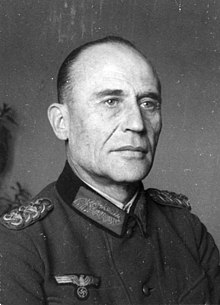Friedrich Kirchner (officer)
Friedrich Kirchner (born March 26, 1885 in Zöbigker ; † April 6, 1960 in Fulda ) was a German general of the armored forces in World War II .
career
Kirchner joined the 8th Infantry Regiment "Prinz Johann Georg" No. 107 of the Saxon Army as an ensign on February 28, 1906 . On January 27, 1907 he was promoted to lieutenant , in 1911 transferred to the 1st Uhlan Regiment "Emperor Franz Josef of Austria, King of Hungary" No. 17 and on July 11, 1913, first lieutenant . With his regiment he went to the First World War in August 1914 and came to the Western Front to secure the border . In September 1914, the unit was transferred to the Eastern Front and Kirchner, who had been promoted to Rittmeister on July 24, 1915 , was deployed as deputy adjutant of infantry regiment No. 474, as well as squadron leader , general staff officer and battalion commander until the end of the war .
After the end of the war he was accepted into the Reichswehr and served in the 12th (Saxon) cavalry regiment in Dresden . After he was promoted to major on February 1, 1928, he was transferred to the staff of the 2nd Cavalry Division in Breslau on April 1, 1928 . On October 1, 1932, he took over the squadron of the 10th (Prussian) cavalry regiment in Torgau . A year later he was entrusted with the leadership of the 11th (Prussian) cavalry regiment in Neustadt , Upper Silesia and promoted to colonel on November 1, 1934 . From October 1, 1935 to November 10, Kirchner commanded the 1st Rifle Regiment, was promoted to major general on March 1, 1938 and then took over the 1st Rifle Brigade in November 1938.
With the brigade he took part in the attack on Poland at the beginning of the Second World War. On November 3, 1939, he was entrusted with the leadership of the 1st Panzer Division and on February 15, 1940 appointed its commander. A short time later, on April 1, 1940, Kirchner became lieutenant general . During the western campaign his division was under the XIX. Army corps of General der Panzertruppe or Colonel General Heinz Guderian , which contributed significantly to cutting off the Franco-British troops in Belgium and northern France. For his services he was awarded the Knight's Cross of the Iron Cross on May 20, 1940 .
He led the 1st Panzer Division at the beginning of the attack on the Soviet Union and was wounded on July 16, 1941. On November 15, 1941, he took command of the LVII. Army Corps (later renamed Panzer Corps), which he kept until the end of the war with several interruptions. In this capacity he was promoted to General of the Panzer Force on February 15, 1942. It was mentioned in the Wehrmacht report on February 4, 1943 and November 27, 1944.
After the surrender , he was taken prisoner by the US on May 8, 1945 , from which he was released in 1947.
Awards
- Iron Cross (1914) 2nd and 1st class
- Knight's Cross of the Military-St. Henry's Order on July 19, 1918
- Knight's Cross 1st Class of the Order of Albrecht with Crown and Swords
- Austrian Military Merit Cross III. Class with war decorations
- Clasp for the Iron Cross, 2nd and 1st class
-
Knight's Cross of the Iron Cross with oak leaves and swords
- Knight's Cross on May 20, 1940
- Oak leaves on February 12, 1944 (391st award)
- Swords on January 26, 1945 (127th award)
- German cross in gold on April 22, 1942
- Tank battle badge in silver
literature
- Dermot Bradley (Ed.): The Generals of the Army 1921–1945. The military careers of the generals, as well as the doctors, veterinarians, intendants, judges and ministerial officials with the rank of general. Volume 6: Hochbaum – Klutmann. Biblio Verlag, Bissendorf 2002, ISBN 3-7648-2582-0 , pp. 471-472.
Individual evidence
- ↑ a b c d Ranking list of the German Imperial Army. Ed .: Reichswehr Ministry . Mittler & Sohn publishing house. Berlin 1930. p. 125.
- ↑ The Royal Saxon Military St. Heinrichs Order 1736–1918. An honor sheet of the Saxon Army. Wilhelm and Bertha von Baensch Foundation. Dresden 1937. p. 369.
- ↑ a b Veit Scherzer : Knight's Cross bearer 1939–1945. The holders of the Iron Cross of the Army, Air Force, Navy, Waffen-SS, Volkssturm and armed forces allied with Germany according to the documents of the Federal Archives. 2nd Edition. Scherzers Militaer-Verlag, Ranis / Jena 2007, ISBN 978-3-938845-17-2 , p. 442.
| personal data | |
|---|---|
| SURNAME | Kirchner, Friedrich |
| BRIEF DESCRIPTION | German General of the Armored Force in World War II |
| DATE OF BIRTH | March 26, 1885 |
| PLACE OF BIRTH | Zobigker |
| DATE OF DEATH | April 6, 1960 |
| Place of death | Fulda |
